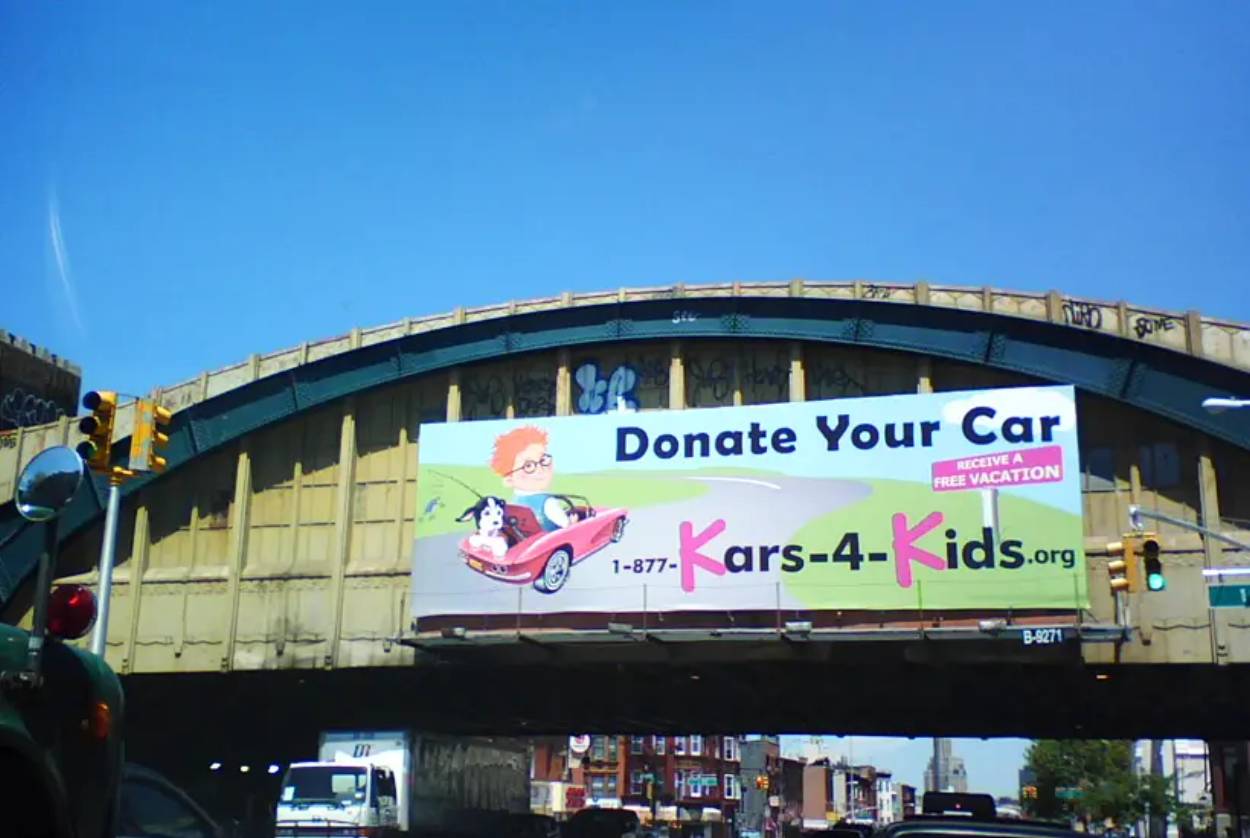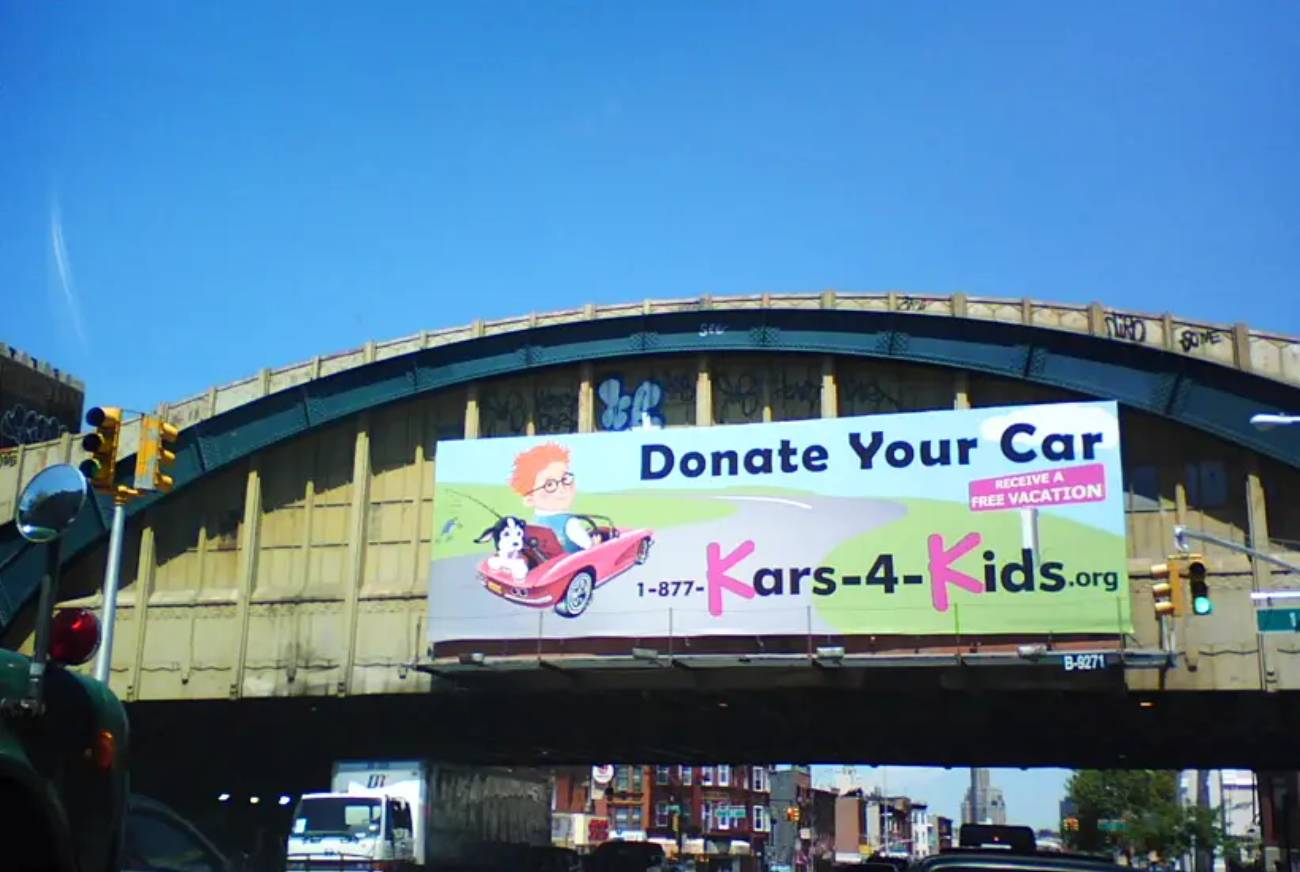Kars 4 Kids Rakes in the Buckz
A well-branded Jewish charity goes to great pains to avoid calling itself Jewish—and takes in millions nationwide




The jingle is decidedly cute and catchy, both annoying and familiar. You know the tune: one-eight seven seven kars 4 kids. Don Imus was caught ranting about it in 2010 as it played during a commercial break on his radio show. Radio duo Opie and Anthony echoed the sentiment, saying that “the commercial goes right into your very soul.” The opening segment to a December 2014 Saturday Night Live segment parodying the United States Military torture report joked the earworm was created by the same psychologists who developed the torture techniques and wondered whether the charity helps the kids or the cars.
The jingle belongs to a national charitable organization that has a presence in every state, as well as countless billboards, Internet advertisements, and a recently released television commercial (click if you dare) that puts adorable faces to the sweet voices behind the ditty: four goofy-looking kids clad in ’80s-band style clothes, lip-syncing and rocking out on signature-pink guitars.
Besides its impeccable branding, the charity blitzes listeners with exciting phrases like “maximum tax deduction,” “free vacation voucher,” and the catchy phrase: “donate your car today.” But the ads conveniently leave out how it all works or where the money goes. And while the SNL clip was a joke, it also raises an obvious question: How exactly do cars go to help kids—and which kids? With rare exceptions, like after Hurricane Sandy, the organization does not issue statements about its operations, preferring to quietly list its specific charitable targets in remote pages on its website. And as Doug White, now the director of the Graduate Program for Fundraising Management and a professor at Columbia University, described it to Chris Glorioso of NBC 4 news in 2012, according to the IRS, “Kars 4 Kids does not exist.”
***
Kars 4 Kids—officially listed in tax documents as “JOY for Our Youth” (and since 2014 listed as kars4kids)—was founded by Rabbi Chaim Mintz in the mid-1990s to help finance Mintz’s charitable endeavors by turning old unwanted cars into cash. The jingle, for which the charity is most famous, was a foundational piece of the development of the organization. The exact history of the tune is a little fuzzy, but Wendy Kirwan, director of public relations at Kars 4 Kids, said it was written by a volunteer sometime in the late 1990s, the music adapted from a Country Yossi song, “Little Kinderlach,” whose lyrics exalt the coming of a messiah: “It’s gonna be the little kinderlach/ who’ll make Moshiach come.” Say what you want about the jingle—Peter Hartlaub of SFGate called it “an assault on the senses”—it is an indefatigable earworm. Kirwan credited it with helping to take the charity from a small local organization to a national phenomenon. As for why the organization goes by the name Kars 4 Kids, instead of its official charitable name, Kirwan said that “branding-wise,” Kars 4 Kids “is a little more catchy.” The charity is now run by Rabbi Eliyahu Mintz, Chaim’s son. Eliyahu declined to comment for this piece.
Kars 4 Kids is just one of many car-donation-based charities. A potential donor calls and arranges for the car to be picked up, free of charge. The cars are then either broken down for spare parts or fixed up and resold. Either way, the donor receives a tax deduction equal to the value of the car (if it is under $500 the donor self evaluates, if it is over $500 Kars 4 Kids will provide a receipt of sale). People are spared the hassle of dealing with an unwanted hunk of metal and receive a nice tax break. According to White, many car-donation-based charities that operate under this simple model “hoodwink” the public, losing a large portion of the money raised from the sale to the middlemen who recycle the car or sell it on behalf of the charity. Kars 4 Kids is one of the few that does most of the work in house and thus avoids many of these losses.
But even though Kars 4 Kids seems to be straightforward with its fundraising model, it is much less forthcoming about how it distributes the funds. Unlike many commercials for charity groups, the Kars 4 Kids segments and billboards never feature testimonials from the charity’s beneficiaries. The group’s generic advertising model has helped their message spread, but it has also cost them.
In the last few years, the charity has found itself the target of multiple lawsuits. In 2009, the state of Oregon settled with Kars 4 Kids for $65,000 over “misleading statements” in their advertisements. A representative from the Oregon attorney general’s office told me that the charity was not registered in the state and that the “organization was using misleading solicitations to obtain vehicle donations.” For example, Kars 4 Kids had offered to provide a “free vacation” with every car donation. Instead, the state argued, this was only a voucher for a couple of nights in a hotel, which did not include various surcharges, taxes, and fees. Kirwan admitted that Kars 4 Kids “made mistakes” in some of its advertisements, but she countered that “when you are active in all 50 states, you are bound to run into issues.” She added that Kars 4 Kids is now 100 percent in compliance. The agreement with Oregon did not force Kars 4 Kids to acknowledge any wrongdoing, but at the very bottom of the “terms and conditions” page of the Kars 4 Kids vacation voucher section reads one glaring sentence: “KARS 4 KIDS DOES NOT OFFER THE VACATION VOUCHER IN THE STATE OF OREGON.” A similar lawsuit was filed and settled with the Pennsylvania attorney general, and an investigation by the attorney general’s office in New York was closed in December 2014 with no charges filed.
Besides harping on the definition of the word free, the Oregon attorney general also pointed to the fact that Kars 4 Kids “gives the majority of the money it receives from vehicle donations to another charitable organization, Oorah, for the purpose of paying for children to attend religious schools.” And it is true: Kirwan said that as much as 60 percent of the money donated in a given year is then gifted directly to the explicitly religious Oorah, which is also run by Rabbi Eliyahu Mintz and is headquartered at the same address in Lakewood, N.J. But that percentage provided by Kirwan clouds the true amount of the donation. For example: In 2013, Kars 4 Kids raised around $28 million, over $12 million of which was spent solely on advertising and promotional activities. Of the remaining donations, a few million was spent on payroll and administrative expenses, while the rest, $12.5 million, was gifted directly to Oorah, representing around 80 percent of the money not spent on advertising and promotional activities. Kars 4 Kids itself only spent a few hundred thousand dollars to benefit the “kids” it claims to help in its advertisements.

According to tax forms, Oorah is “a Jewish outreach organization for the purpose of imparting Jewish education, values, and traditions, as well as guidance and support, to Jewish children who lack access to these fundamentals.” The charity does little fundraising outside of the grants it receives from Kars 4 Kids each year. Its website describes the many programs it offers children, which range from summer camps, to helping students find appropriate Jewish day schools, to providing tuition assistance for students transitioning from free public school to yeshiva. Oorah also offers scholarships to those desiring to spend a gap year abroad in Israel.
In response to questions that Kars 4 Kids is merely a front for Oorah, Kirwin argued that “we don’t hide anything. If you visit our website or call to make a donation,” it becomes increasingly clear where the money is spent. She also acknowledged that though the commercials are not specific to the true nature of the organization, “there isn’t time to go into it in a 60-second description,” on the radio or TV. Essentially, she places the onus on donors to research the charity before donating.
And she does have a point—if you have the time to visit their website and sift through their material it is fairly clear that Kars 4 Kids is an explicitly Jewish organization. On the Kars 4 Kids “About Us” page, the charity states: “We accomplish this through our various programs and largely through the funding of Oorah, a national nonprofit organization.” And at the bottom of many of the Kars 4 Kids webpages is the disclaimer: “Your donation will benefit Kars 4 Kids, a national organization dedicated to addressing the educational, material, emotional, and spiritual needs of Jewish children and their families.” But when I called the donation hotline, there was no unsolicited indication that I had contacted a Jewish charity. When I asked who my donation would help, I was told that “the money donated goes toward providing educational and cultural services for Jewish children.”
So, while the commercials cloud—or at least don’t trumpet—the true nature of the charity, Kars 4 Kids remains open about it when pressed for more information. And none of this is to say that Kars 4 Kids does not also provide some important services. In the aftermath of Hurricane Sandy, the charity worked with other local organizations to distribute winter coats to those devastated by the storm. They have run other coat- and backpack-giveaway programs in the New York area. Kars 4 Kids has even developed an app to help remind parents of the dangers of leaving sleeping children in an overheated car. Kirwan emphasized in our phone conversation that even non-Jewish donors, who may have unknowingly given to an explicitly Jewish organization, can appreciate the amazing work the organization does for students all year long, even if it is for a targeted segment of the population.
Are donors being misled? “No regulations will ever stop this,” said White. “We just have to raise awareness so the public understands” whom they are giving to when they give their car away. Without that, Kars 4 Kids, the most successful car-donation charity, has little incentive to be more forthcoming, or to alter the perfect jingle, the envy of all advertisers.
***
Like this article? Sign up for our Daily Digest to get Tablet Magazine’s new content in your inbox each morning.
Zack Schrieber is an intern at Tablet Magazine. Follow him on Twitter @zschrieber.
Zack Schrieber is an intern at Tablet Magazine. Follow him on Twitter @zschrieber.